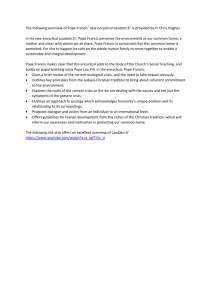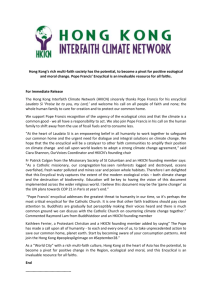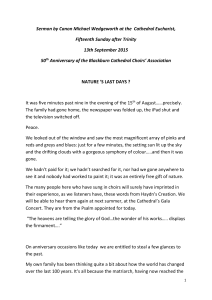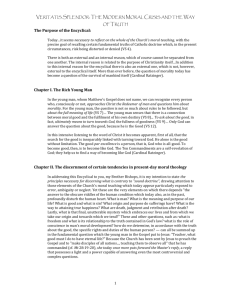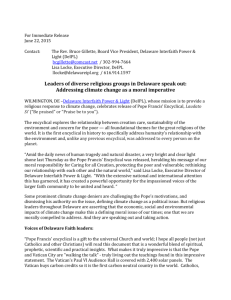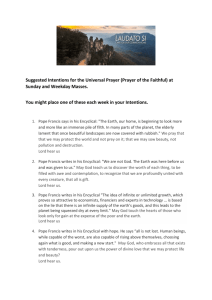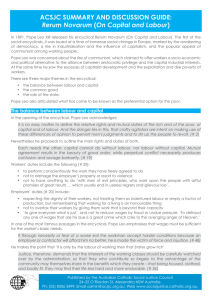Pope Francis and the Environment: Yale Examines Historic Climate Encyclical
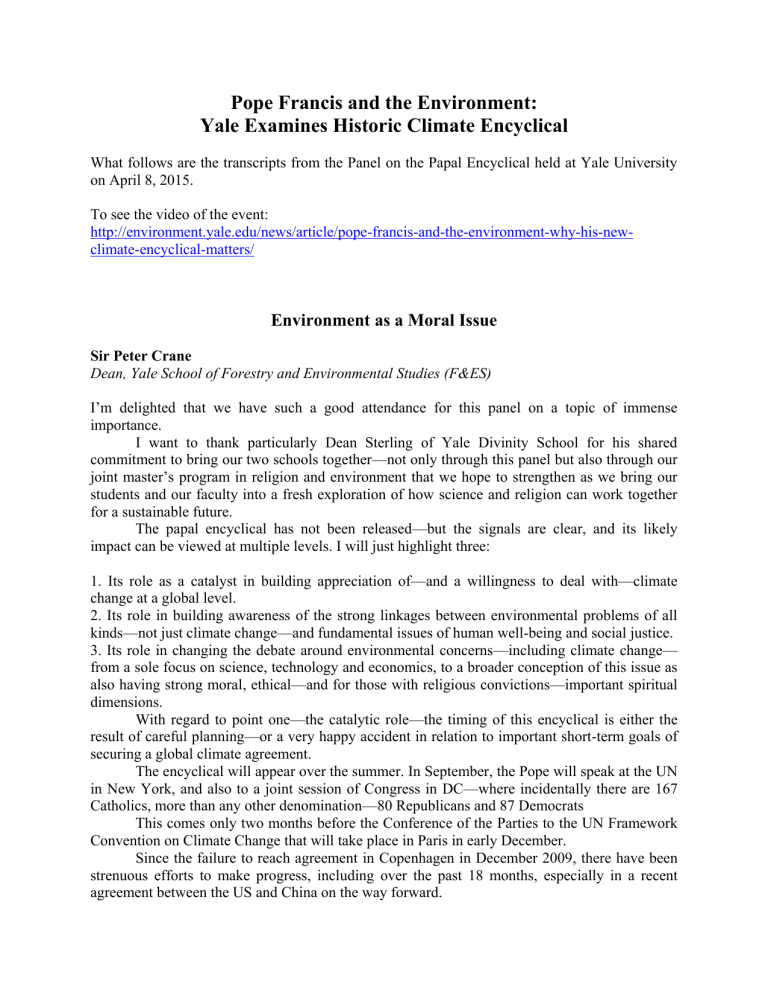
Pope Francis and the Environment:
Yale Examines Historic Climate Encyclical
What follows are the transcripts from the Panel on the Papal Encyclical held at Yale University on April 8, 2015.
To see the video of the event: http://environment.yale.edu/news/article/pope-francis-and-the-environment-why-his-newclimate-encyclical-matters/
Environment as a Moral Issue
Sir Peter Crane
Dean, Yale School of Forestry and Environmental Studies (F&ES)
I’m delighted that we have such a good attendance for this panel on a topic of immense importance.
I want to thank particularly Dean Sterling of Yale Divinity School for his shared commitment to bring our two schools together—not only through this panel but also through our joint master’s program in religion and environment that we hope to strengthen as we bring our students and our faculty into a fresh exploration of how science and religion can work together for a sustainable future.
The papal encyclical has not been released—but the signals are clear, and its likely impact can be viewed at multiple levels. I will just highlight three:
1. Its role as a catalyst in building appreciation of—and a willingness to deal with—climate change at a global level.
2. Its role in building awareness of the strong linkages between environmental problems of all kinds—not just climate change—and fundamental issues of human well-being and social justice.
3. Its role in changing the debate around environmental concerns—including climate change— from a sole focus on science, technology and economics, to a broader conception of this issue as also having strong moral, ethical—and for those with religious convictions—important spiritual dimensions.
With regard to point one—the catalytic role—the timing of this encyclical is either the result of careful planning—or a very happy accident in relation to important short-term goals of securing a global climate agreement.
The encyclical will appear over the summer. In September, the Pope will speak at the UN in New York, and also to a joint session of Congress in DC—where incidentally there are 167
Catholics, more than any other denomination—80 Republicans and 87 Democrats
This comes only two months before the Conference of the Parties to the UN Framework
Convention on Climate Change that will take place in Paris in early December.
Since the failure to reach agreement in Copenhagen in December 2009, there have been strenuous efforts to make progress, including over the past 18 months, especially in a recent agreement between the US and China on the way forward.
At the end of March this year, the new US climate pledge was to cut carbon emissions
26-28% by 2025 compared to 2005 baseline—this is approximate doubling of the pace of reduction to 2.3 to 2.8% a year.
The EU and China have also made cuts—and there are financial commitments as well.
This encyclical comes at a critical moment—and can be viewed as an important part of a process that will create new impetus—in the concerted push to reach a global agreement on climate change.
And it will fall on fertile ground. Work by Tony Leiserowitz in the Yale Project on
Climate Change Communications at F&ES shows that a solid majority of Catholics—seventy percent—think that global warming is happening—and also that Catholics in the U.S. are significantly more worried about global warming than other Christians.
With regard to point two—the connection to issues of social justice. The encyclical will reemphasize that the world’s most vulnerable people shoulder the greatest environmental burdens—and that it is the health and daily lives of the poor that are, and will be, most impacted by environmental degradation.
On April 28, there will be a high level meeting at the Vatican of V atican officials, plus science, business, diplomatic, development, religious leaders, academicians and scholars— including members of the Pontifical Academy of Sciences and the UN Secretary General.
The aim will be to raise “awareness and build a consensus that the values of sustainable development cohere with values of the leading religious traditions, with a special focus on the most vulnerable; to elevate the debate on the moral dimensions of protecting the environment in advance of the papal encyclical; and to help build a global movement across all religions for sustainable development and climate change throughout 2015 and beyond.”
The outcome will be “A joint statement on the moral and religious imperative of sustainable development, highlighting the intrinsic connection between respect for the environment and respect for people—especially the poor, the excluded … children, and future generations.”
With regard to point three—changing the nature of the debate—as noted above—the encyclical will give new prominence to the ethical and moral dimensions of environmental degradation—including climate change.
This will perhaps be its most lasting and important contribution as these ideas become incorporated into mainstream Catholic teaching with its vast reach, but also help bridge what is often seen as a deep divide between science and religion.
Science and religion, in their own ways, both awaken a sense of awe and wonder at the complexity and beauty of life. Combined with the indisputable link between the health of people and communities and the health of the environment, the encyclical will emphasize that care and humility in our relationship to the natural world is a moral and ethical issue.
A little under a year ago the Pope made a short speech in which he emphasized that the
“beauty of nature and the grandeur of the cosmos” was a Christian value. As a scientist I would go further, I would say it is a universal value, and a universal value that most scientists would subscribe to with enthusiasm.
A Letter from Pope Francis on Climate and Environment:
Why a Papal Encyclical May Matter
Margaret Farley
Yale Divinity School, Emeritus
Something “matters” to us when it is important to our loves, our fears, our needs, our convictions, or even our puzzlements. Ordinarily, papal encyclicals offer teachings that are meant to be taken seriously by Roman Catholics, not necessarily as absolute doctrines, but as official articulations of religious and moral understandings. They aim to clarify religious beliefs and ethical issues, and to inspire those who read or hear about them. They may engender disagreements over some of their content, and they may illuminate change in church practice and belief, moving from earlier articulations to more adequate insights and imperatives. In response to the question, then, as to why a new encyclical on the environment might “matter” to Roman
Catholics and even to a wider audience, the answer, as I see it, is not that suddenly every hearer will feel bound to act in accordance with what is said; it is, rather, that attention will be paid to what is offered, dialogue will ensue, new insights may grow, and new experiences of moral claims regarding climate, environment, and crisis will awaken within us. Let me propose some examples of what may be included in such an encyclical that may make it “matter” significantly for us.
First, the encyclical can offer what are new perspectives for many (not all) on the relationship that ought to be between human persons and nature. From relations primarily of utility, domination, exploitation, nature-human relations may instead be based on the intrinsic value inherent in each, and in all non-living, living, non-human, and human beings. Each has both instrumental and intrinsic value, created and held in being by God, beautiful in themselves, with some telos , some finality. Nature and humanity are not thereby wholly separate from one another, whether over against or in complementarity. Humanity is situated within nature, in a broader view of nature. The relationship is one of interdependence, participation, and for humans, the possibility of conscious gratitude and awe. For Pope Francis, this yields a religious obligation to protect creation, to “care” about the work of God, to nurture rather than diminish the possibilities of both nature and humanity.
A second example of an important perspective for inclusion in the encyclical if it is to
“matter” to many of us, is the development of skills and sensibilities for moral discernment.
Resources for moral discernment and action are available in particular in the Roman Catholic tradition known as Catholic Social Teaching. From the late nineteenth century on, this tradition has been expanded and refined, so that issues of justice (such as racism, economic inequities, just wages, rights of workers to organize, war and peace, nuclear disarmament, etc.) have been taken up by scholars as well as church leaders. Human and legal rights theories have been developed and applied in response to moral imperatives undergirded by principles such as respect for the dignity of every individual, concern for the common good, solidarity in communities, religious liberty, etc. With these have come ethical claims for justice and care not only in one’s own group but in relation to all peoples, including future generations. These kinds of efforts have linked together issues in environmental ethics, such as economic exclusion and inequality linked with ecological devastation, care for all of creation and the principle of preferential option for the poor. This kind of analysis has been cited by Pope Francis on multiple occasions. New understandings of “natural law” have allowed the questioning of rigid notions of eternal “order,”
and the importance not only of understanding human and non-human suffering but the work of the sciences in the service of ecological restoration and protection. An encyclical that can touch the consciences of people on such issues will surely “matter” to the world of the present and the future.
There are many other examples to be tapped in probing problems and perspectives that
“matter” for those who may receive such an encyclical. Problems such as population growth and the environment, women’s burdens which escalate with the devastation of sources for water and food, extreme poverty, and the circumscription of options for education. The encyclical to be focused on climate and environment could go a long way toward simply understanding and challenging such needs, and longer still toward remedying them. If it fails to do so, the crises before us may only increase. Perhaps either way, we shall learn more about what really matters in our lives and the world in which we live.
Response from Other Religions
Mary Evelyn Tucker
Forum on Religion and Ecology at Yale
Yale School of Forestry and Environmental Studies (F&ES)
Yale Divinity School
It may be clear by now that the encyclical will have a significant impact on Christians, in terms of awakening awareness to the scale and scope of the environmental crisis, as well as the moral dimensions of these challenges. There has been much movement in Christian circles regarding concern for the environment. The World Council of Churches made a landmark announcement last year endorsing fossil fuel divestment. The Religion, Science, and the Environment symposia hosted by the Greek Orthodox Patriarch Bartholomew (the “Green Patriarch”) have brought these issues home for more than 15 years. The Evangelical Environmental Network has made great strides in outreach and education of the Evangelical communities, regarding climate change and environmental degradation. And the indispensable work of Yale’s own Tony Leiserowitz has recently shown how Christians are favorably disposed to respond to our environmental problems.
The question I will be addressing here is:
Why is the papal encyclical important not only for Christians, but also for members of other religions as well? There are more than a billion Muslims, a billion Hindus, a billion Confucians and nearly 500 million Buddhists many of whom will also be hearing this call to action. While it is clearly difficult to predict the range of responses from such large numbers of people, I will offer a few general observations focused on Asia where nearly two thirds of the world’s peoples live.
This is an area of the world that I have studied and traveled in for over forty years, especially China, Japan, and India. The rapid changes I have seen in these four decades are why I am doing this work in religion and ecology—so that the diverse environmental ethics of the world’s religious traditions will be part of the search for environmental solutions. As we know, people’s cultural norms and religious values matter enormously in changing attitudes and behavior. This is why we are identifying environmental values from all the world’s religions including the Asian traditions: Buddhism, Hinduism, Confucianism, and Daoism. These will be a creative source of behavioral change.
Clearly Asia is increasingly important for the future of our planetary life systems. With rapid and relentless industrialization in India and China, over two billion people in these countries are seeking the fruits of modernization. But the cost has been immense in terms of pollution of air, water, and soil, as well as the loss of biodiversity. The health of both people and ecosystems is greatly stressed. Food safety is questionable. In China, foreigners—both business people and educators—are leaving because their health is becoming severely compromised. A recent YouTube series called “Under the Dome” showed the dangerous levels of pollution in
Chinese cities. Over 250 million people viewed it before it was shut down (you can still watch it here in the U.S.). That this was allowed to be broadcast in China indicates that there is increasing awareness among government officials and local citizens that this level and rate of economic growth is not sustainable. The situation is at a critical point.
For more than forty years (since the Stockholm conference in 1972) environmental scientists and policy makers, lawyers and economists have been struggling with these mounting problems of environmental protection and economic development around the world, such as we see in Asia.
As another approach, we have worked to include cultural and religious values as part of the solution to environmental problems. Over the last twenty years, we in the Forum on Religion and Ecology have been drawing together the research and insights of scholars and theologians of the world’s religions. We have identified ideas, ethics, and practices regarding ecology and justice from these traditions in books, journals, and films. Now there are environmental statements from the world’s religions, educational programs, and grassroots projects on the ground. These did not exist twenty years ago. You can see these on our Forum website
(fore.yale.edu).
The Pope’s encyclical, then, will help to awaken an even broader response among the world’s religious communities, and I would suggest it may be a source of encouragement among environmentalists who are not overtly religious but who care deeply about the environment. It may assist the religious response to environmental issues in several ways.
The Pope is convening religious leaders from all over the world at the Vatican on April
28 to highlight the moral dimensions of our global environmental crisis, exemplified in particular by climate change. He will urge these leaders to join him in speaking out on the human suffering this is causing, especially for the poor.
This will encourage religious leaders to address these issues in the language of their own traditions, as the 17 th
Karmapa did here at Yale when he identified Buddhist values for environmental conservation. His influence, along with the Dalai Lama, extends to millions of people throughout the Himalayan region and beyond. Dekila will be describing her work with him to involve fifty monasteries in environmental protection. Other Asian religious leaders will be responding similarly. For example, Sunderlal Bahuguna in India is bringing Gandhi’s teachings to bear on environmental challenges in India, especially large dams and deforestation.
The encyclical will spark even further exploration of the resources for environmental ethics in the traditions of India (Hinduism and Jainism) and of China (Confucianism, Daoism, and Buddhism). Our Harvard books on these religious traditions and ecology have been published in India and translated into Chinese. Indeed, conferences are proliferating in China focused on creating an ecological civilization based on the ethical values of their traditions, especially Confucianism. One will take place in Hong Kong this summer that we will attend.
In addition, the fastest growing religion in China is Christianity. There are over 100 million Christians in China (more than the eighty-five million members of the Communist
Party). These Christian groups will certainly be influenced by the message of the encyclical, especially as they are living in regions adversely affected by environmental problems such as pollution, deforestation, flooding, and food safety.
The encyclical, then, will speak to Christians around the world, but it will also speak to religious leaders and laity in other religious traditions. It will deepen the moral awakening to ecology and justice as one issue—ecojustice. It will ignite a groundswell of deepened concern for addressing these challenges in terms of both science and religion, ecology and ethics, as this panel illustrates.
Now with the papal encyclical there is an opportunity for scaling up and moving forward with the moral force of shared concern. Let us hope that here at Yale we will also respond to the challenges—not just at the Forestry and Divinity Schools, but with a broadened attention to our curricular choices and sustainability practices for preparing our students to contribute to a flourishing future.
Reflections from the Himalayas
Dekila Chungyalpa
McCluskey Fellow, Yale School of Forestry and Environmental Studies
Good evening, thank you for having me here. Before I talk about the work I’ve been doing, I thought I would give a small overview of how climate change is affecting the Himalayas. The
Tibetan plateau is the source of water for 7 rivers for mainland Asia. This includes the Indus,
Ganges, Mekong, Yellow, and Ganges Rivers. The source of all these rivers is in the Tibetan plateau. As you can imagine as climate change affects how water is stored in the Tibetan plateau, it’s obviously going to affect billions of people in mainland Asia.
One of the biggest challenges of climate change is that the impact is being felt much more rapidly in the mountain areas like Nepal and Bhutan, than in the rest of the world and certainly in the lowlands of India and Pakistan. So when we think about climate change in the
Himalayas, what we are looking at is increasing temperature, glacial retreat, snow melt leading to glacial lake outburst, floods and, in contrast, drought, and it often happens within a three month gap. You have floods in the monsoon and then the monsoon tapers and you end up having major droughts.
In terms of how communities are affected in the area, of course you have immediate disasters, and that is what most people think of when they consider impact from climate change among people. Usually it is a lot of people who get displaced, who are injured, die and roads that are blocked off, but there is also a deeper problem that is going on and that is the loss of livelihood and changes in crop patterns. So we are also talking about mass hunger that is moving into the regions, and people aren’t able to identify that as a climate change problem, or an impact that is happening because of climate change.
There is a third issue that comes in, that governments seem to be aware of but that society is not picking up on, which is conflict. Before I created this program to work with religious leaders, I worked in the Mekong region. The first time we had a climate change adaptation conference, what was really surprising was that the government was sending military advisors to these conferences. The government was seeing climate change as a major cause for future
conflicts. We certainly see it already in the Himalayan region, a lot of refugees moving in from
Bangladesh and how that changes society and how that changes how communities look at natural resources.
So these are some of the impacts that we are seeing in the Himalayas. I think some of the biggest challenges in addressing these impacts include the lack of awareness, of course, and most of us probably deal with this at some level or the other. Then there is the opposite problem, which is too much awareness. People are completely frozen and there is this state of paralysis.
People don’t know who should be responsible, there is this sense that it is somebody else more important, someone more civically engaged should actually be more responsible for this problem. I think that leads to a situation where the communities are incredibly disempowered.
They understand that what they are seeing is caused by climate change, and (unlike in the U.S. or the U.K. or Australia), in the Himalayas and most places I have worked in around the world, people really believe that it is climate change causing these problems.
So going back to the state of paralysis, this frustration, one of the biggest challenges we face is how do we make the communities empowered, to become more resilient, to be able to adapt well to climate change?
In my case, because I began working for his holiness the Karmapa (I hope some of you got to hear him speak yesterday), I began working with a group of monasteries in the Himalayas.
And he actually asked me to start training monks and nuns on environmental issues, and provide science training basically so they could understand what was happening in their communities.
What came out of it was an eco-monastic movement led by him with fifty-five monasteries doing environmental projects. There are several kinds of projects with impacts that have come in the last eight years. They have their own immediate ecological footprints. Some of these monasteries have 5000 monks and nuns in their communities. So they buy from the local market. They have trucks. They have cars. They build buildings, massive concrete buildings sometimes. And so they have their own ecological footprint and ability to change that footprint.
They have this moral leadership that everyone has already mentioned. They have this enormous sway in how communities see different issues and how they are, in some sense, triggered to think about issues and to feel about issues.
I think that another thing I have noticed in terms of impact by way of engaging them is that we see a ripple effect when they get involved in something. So an example I can give is that in Nepal, all the monasteries in Nepal actually picked climate change as their number one issue.
Because Nepal is one of those places where, first of all there is a lot of knowledge on the ground, and secondly, it is something that is very visibly felt, and they feel the impact immediately.
There has been a lot of glacial lake outburst, flooding, and a lot of drought in that area.
The news often carries information including how wildlife is treated, how tigers are moving upland, the tree line is shifting. So generally speaking, in Nepal there is lot of awareness. All of the monasteries chose to build solar and to use solar. And what I have noticed about the project activities that work is that they are win/win combinations.
So another problem in Nepal is that there is a lot of load shedding. You might have power for only four or five hours. That is the amount of electricity you are going to get. So for the monasteries to pick solar, it really is a win/win for them. They have an independent source of energy. And they also know they are doing what they can to address climate change. When these monasteries decided to do solar, they put it in the most visible places they could find, often right where the golden dome is on top of the temple. And what we’ve seen is that there is almost a
circle effect. When there is a visible project, we see that the communities often adapt and pick it up rather quickly.
Another thing that they picked up was organic gardens. Again it was a win/win. It was something they knew affected their diets and made them more healthy. At the same time it went back to this idea of being more resilient to climate change disasters. Again, we saw a growing impact in the community as more and more communities started doing this. So having monasteries become engaged has definitely made a huge difference in how communities are adapting to climate change. At the same time, the monks and nuns themselves have often expressed how they feel really lost. They feel incredibly empowered and they are doing whatever they can and then there is a pause and they say, “What comes next?” and there is no global agreement. They actually track what’s happening on the global level. They have this frustration like we have since the Lima conference, and so they go through that too. This is where I think the papal encyclical matters so much. Going back to what His Holiness the Karmapa said, “What do you do when you feel so frustrated and depressed and so on?” He said, “You have to be part of the community because that’s what sustains you.”
What we are seeing right now that is incredible is that religions are converging on this issue. It’s not just one religious leader who is speaking up on it, hammering at the door, speaking up about climate change. We are seeing a chorus of voices that are coming around the world.
And I know for the monks and nuns we actually have talked about the Pope quite a bit and social justice because eco-justice isn’t how they see the world. So for them to start putting this together with other religious leaders and with what other religious communities are doing is the most empowering thing that can happen for them.
What I see as a sign of hope more than anything else is that there is such a movement working around the world. It is not just a theoretical movement. As an activist it is the most positive thing I see—it is a very practical movement. The Pope is putting out an encyclical, and that won’t stop there. Actually churches are doing what they can to change their own footprint.
Monasteries across the Himalayas and churches around the world are changing their own footprint while trying to get the rest of us to join them and see it as a moral obligation.
A Price on Carbon
Douglas Kysar
Yale Law School
Despite efforts to manufacture doubt about climate science, responsible policymakers have actually accepted the seriousness of the climate change problem for quite a long time. Indeed, in
1992, the nations of the world negotiated the United Nations Framework Convention on Climate
Change—known as the UNF Triple C—in which nations obligated themselves to adopt policies with the goal of "preventing dangerous anthropogenic interference with Earth's climate system."
Now, this obligation already exists as a matter of international law, but in the years since
1992 we have seen a steady rise in global greenhouse gas emissions, punctuated only by an occasional regional or global economic crisis that temporarily slows the growth in emissions.
So, why has the UNFCCC failed to generate meaningful climate action?
It is not for lack of available policy tools. Indeed, despite efforts to manufacture doubt about the economic sensibility of adopting climate mitigation policies, we have for a long time known that a price on carbon is the simplest and most effective climate mitigation policy available to us.
Just think: If the U.S. Congress got its act together, we could reach eighty percent of our country’s greenhouse gas emissions by regulating fewer than 3,000 entities through an upstream carbon tax. We could start collecting this tax tomorrow because the necessary entities are already subject to administrative tax collection regimes. And tomorrow we could also start returning the economic value of the carbon tax to individuals through a linked reduction in payroll taxes. The logic of this policy is so simple a kindergartner could grasp it, but our Congress cannot: tax bad things, not good things. Pollution is bad, employment is good. Voila.
So why have we failed to adopt this simple and obvious policy that would help to fulfill the urgent climate responsibilities that we have already acknowledged and accepted as part of international law?
The answer is complex and I can only offer a crudely digested version here, but it goes like this: Because the global climate policy process has been held hostage by a country—this country—which has found its own political process held hostage by economic interests that are capable of investing not only in traditional capital, but also in the capture of laws and institutions that are intended to regulate capital, so that more and more the rewards from human cooperation accrue in unequal proportions to a self-perpetuating and unaccountable elite.
So, now I can answer the question posed to this panel of why the forthcoming encyclical is important: the encyclical is important because Pope Francis will not merely address climate change and humanity’s obligation of planetary stewardship. He will address those issues within the context of what he calls an “integral ecology” that encompasses concerns of economic justice, true human development, and global solidarity.
Pope Francis recognizes, as he said during his All Saints’ Day Homily of last year, that
“[w]e are capable of devastating the Earth far better than the angels. And,” he continued, “this is exactly what we are doing … we destroy creation, we devastate lives, we devastate cultures, we devastate values, we ravage hope.”
Pope Francis recognizes, as he told the World Meeting of Popular Movements, that “[a]n economic system centered on the god of money … needs to plunder nature … to sustain the frenetic rhythm of consumption that is inherent to it.”
And, finally, as he told delegates to the UNFCCC last year, Pope Francis recognizes that
“[t]he effective struggle against global warming will only be possible with a responsible collective answer that goes beyond particular interests and behavior and is developed free of political and economic pressures.”
Climate change may be the most pressing, most wicked environmental problem facing humankind, but it may also be our best opportunity to address underlying economic, political, and cultural diseases that give climate change its appearance of inevitability. The encyclical will help to diagnose and minister to these underlying pathologies, so that if we do indeed heal the planet, we may also have a humanity worthy of inheriting it.
